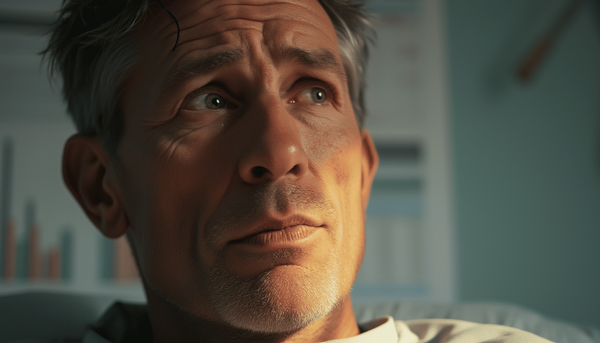Diagnostic overshadowing has long plagued the healthcare system, leading to severe consequences for patients misdiagnosed and neglected. Through my personal struggles, this article sheds light on the urgent need for medical reform to ensure all patients are truly heard and properly treated. It’s a wake-up call and a plea to medical professionals to reassess their diagnostic approaches and advocate for their patients.
The earlier years
From a young age I had become well aquatinted with the health service. I was born with an abnormality in one of my eyes, which required surgery when I was around 3 or 4 years old. As a boisterous young lad I was always hurting myself in some way or another, whether failing from a tree or rope swing my friends and I had precariously made or crashing my bike and breaking an arm of wrist. I was in a cast many times throughout my younger years..
Reaching my early teens I would often be taken for GP checkups for unexplained symptoms, always put down to growing pains with my then GP actually saying “probably just growing pains, whatever they are…” quite shocking now when you look back and think of that response.
Heading towards adulthood and I developed insidious tonsillitis, becoming pretty unwell around once a month for around a week at a time. It was honestly horrendous with red, fleshy, bloody, and rotten pieces of my tonsils coming out. Thankfully, the NHS agreed to remove them, or what was left of them.
Missed opportunities
You get the picture. I won’t go through my medical history and list a plethora of other ailments, diagnosis and further operations, but I had a lot of interaction with GPs and hospitals from a relatively young age.
With the benefit of hindsight, I can also see how things could have potentially been missed and were actually my current diagnosis in its earlier stages of rearing its ugly head.
For instance, I used to experience terrible chest pains as a young person. I remember it vividly. Breathing would hurt, laughing would hurt and it was a pain I couldn’t explain, and I was used to pain, given the number of broken bones I had experienced. I remember being sent for x-rays as it was after these that my then doctor mentioned the growing pains crap.
As an adult with a neuro diagnosis, I now know that these chest pains are and were muscle spasms, and they hurt like hell. They have got much worse over the years. Usually involving the intercostal muscles - the muscles between the ribs - or lower down and likely the diaphragm going into spasm. It’s these that really take my breath away. Strangely, they can also be bought on by laughter, which is, to be quite honest, depressing as hell!
Currently, I have a neuro-genetic diagnosis which means I have a neurological disease which is of a genetic cause, this disease is effectively killing my upper motor neurones - although there is much doubt around the security of this diagnosis, which I will challenge when I meet my new professor this year.
How I got to this point
Getting to this point in my medical journey has taken almost 7 years, at the time of writing, but one could argue, just from reading this, that it has actually been a lifetime, or at least from my pre-teens/early teens.
For the sake of this post we’ll say 7 years as that is when my symptoms became so bad that they interfered and changed my life forever.
Trying to access the care I desperately needed was a battle from the start. My GP, who I had known for a long time, probably since my mid-teens and who I had and still do have a lot of respect and admiration for, demonstrated one of the negatives of having a family doctor. A negative no one talks about, perhaps because many have been fortunate in not experiencing it, nor had to deal with its potentially deadly consequences. Worse, maybe they don’t even realise they or their loved one have been caught up in this unspoken problem.
The perfect storm
As I have said already, I have a lot of respect for my GP. She is a fabulous doctor and a credit to my GP practice. She is my main point of contact to this day and I worry about my primary care when she inevitably reaches her retirement.
However, she has known me for a very long time. In this time she has got to know not just me but my wider family. She’d consulted and/or treated my parents, my siblings and even my aunt. She had a fairly good understanding of my family's dynamics, issues that were present in the family and likely a pattern of mild to moderate mental health difficulties throughout the family.
In my late teens, I was indeed treated for depression and anxiety believed, at the time, to have stemmed from the separation and subsequent divorce of my parents. I was prescribed antidepressants and sent on my way.
It is only with the passage of time and a huge commitment to my own personal development and self growth that I later discovered with the help of professionals that my childhood was filled with abuse. Not sexual but mental, emotional and physical abuse. A childhood without nurture and natural love or affection. A childhood where you were unable to feel and if you did or if you let out those feelings, especially anger or frustration, you would be punished physically. Crying for not understanding something would result in emotional abuse, usually via humiliation and belittling.
I’m sure you’ll agree, it’s hardly surprising one would require medication after being brought up in a such an environment. It was hardly conducive to raising well rounded and stable members of society. Although, I feel it important to add that neither myself nor my siblings have ever been imprisoned or developed any dependancies to drugs. Alcohol. That’s a different story and no, that isn’t me!
Diagnostic overshadowing
Straight up from the heading alone, you’ll probably see why no one knows what this is and why it isn’t talked about outside of the medical community. It’s a term that doesn’t really mean much to the average layperson, but once it is explained, many will probably recognise it for what it is. Deadly.
The definition;
Diagnostic overshadowing is a bias where healthcare providers mistakenly attribute a patient's physical symptoms or behavioural changes to their pre-existing learning disability, autism, or mental health condition, rather than exploring other potential causes.
In simple terms, a doctor may describe your physical symptom, lets say you have a tremor, as due to anxiety, when in fact it could be due to something much more serious.
I am not saying that the doctor may not be right in many situations. We all know that anxiety, depression and even severe stress can cause a whole host of weird and wonderful physical symptoms. Tremor does, in this example, happen to be one such physical symptom.
For my situation, though, I knew something else was at play - I felt it!
I had suffered from depression and anxiety as a teenager, and this was not the same. I was still functioning, going about my daily tasks, helping with my children, working, etc.
Now I also understand that there are many people that live every day with debilitating depression but still manage to hide it and get on with their daily lives while suffering, usually in silence. To these people, I applaud you but also hope you are receiving the support you need and deserve.
For me, though, I just knew this was different.
The hardest part was constantly being placed in the mental health box. The gatekeepers kept slamming the door in my face while chucking prescriptions for antidepressants and talking therapy at me.
Not one physical test
On the day I had my first appointment with a GP regarding my deteriorating health, I took an A4 piece of paper with me. This had 26 lines of things I had noticed about myself that were different or that had changed. Basically, a list of symptoms I needed to show them.
Out of those 26 lines, 6 of those could have been attributed to mental health conditions. However, as I have since learnt on this journey, they can also be symptoms of an underlying neurological disease process or simply, down to my mind noticing that something isn’t right and that something felt off!
During this appointment not a single physical test or examination was carried out by the doctor. I now know the physical test I needed is known as a neurological examination. If I would have received one, I am now under no doubt that it would have been abnormal and would have shown positive neurological signs that would have required immediate and urgent investigation and testing.
Instead, I was sent away with a prescription for antidepressants and a request for some basic blood tests to look for low-level issues such as infection or vitamin deficiency. Which all came back fine.
I must be losing my mind
When you are consistently being told that your symptoms are all psychosomatic, you begin to question your whole self. Likely due to the fact we all know ourselves pretty well and have a natural instinct to notice when things are off or something isn’t quite right with our bodies.
The slightest change, for instance, with how we perceive sensation, which was one of my initial symptoms. My legs, especially my right leg, started to feel different. Made them feel heavy and affected my gait, thus causing balance issues.
You begin to feel like a hypochondriac. Constantly asking yourself if these symptoms are even real. If it wasn’t for the fact that others could see some of them and I was able to video them many times, I would have thought I must be losing my mind.
It was this insidious self doubt that persuaded my wife and I to seek out a private psychiatrist. The idea being that if a specialist consultant in mental health assessed me that they would quickly tell me it wasn’t a mental health problem.
Let’s just say that plan backfired spectacularly! The logic was sound, but it just didn’t play out that way.
What actually happened when we attended an online video consultation was he sided with my GP due to my history and recent experiences. He took the physical symptoms I was having, which we now know are neurological, so things like sensation changes and diagnosed some pretty serious mental health conditions.
By the end of this appointment I had the following diagnosis’s;
- Recurrent Depressive Disorder (current episode severe) with anxiety
- Depersonalisation and Derealisation
- Sleep Paralysis
- CFS/ME (probable)
Thinking back to those early days of my long diagnostic journey, I find it wild that any medical professional can make these kinds of diagnoses from a 45 minutes video consultation.
This Psychiatrist which is a medical doctor with a specialism in mental health conditions, was unable to carry out any physical examinations. If he had, it's highly likely that the outcome of this appointment would have been dramatically different.
It validated my GP and solidified my own thoughts that I must be losing my mind and that I was actually going bat shit crazy.
I guess, in a strange kind of way, it was fortunate that my symptoms worsened to such an extent that nobody could continue to think that they were psychosomatic and biases had to be put to one side.
Diagnostic Overshadowing is so deeply ingrained in the medical profession
Unfortunately, I feel that diagnostic overshadowing is so deeply ingrained in the medical profession that I genuinely don’t think they are even aware that it happens. I also wonder whether they even know of its existence.
Even to this day, with several neurological diagnoses, from some of the best minds in neurology in the UK, I still see diagnostic overshadowing lurking, waiting to be played out.
An example
I had a telephone call today, ironic or what? With a doctor whom I have never met, it was her job to assess me for some support I had requested to help with my day-to-day life.
For context, I had to send in medical evidence to confirm my diagnosis; symptoms, struggles etc and after 7 years, oh my, there is a tremendous amount of paperwork. I think it went into something like 80+ pages!
The phone rang late, may I add, but nonetheless she seemed lovely and we began talking through everything. She commented on the amount of paperwork I had sent in, to which I replied, “well I didn’t want you to miss anything now…”. She proceeded to explain that they have to go through and read all submitted information and make notes on everything.
Ouch! That’ll be why she mentioned it then.
The doctor explained that she’d developed quite the list of both symptoms and diagnosis, and that it “would be impossible to go through everything during our call…”. I may have let out a rather amused, if not slightly menacing chuckle, before realising it probably wasn’t appropriate and quickly disguising it with a well-timed cough.
“I have picked out the ones that feel the most pertinent and grouped many of them as ‘neurological symptoms’ is that ok?” I replied with something along the lines of “As long as it covers the issues I face and live with on a daily basis, then yeah, that’ll be fine.”.
She began reading through everything she had written down. Afterwards, checking she’d got everything. Which I was unhappy to admit that it sounded about right.
The next thing she said was, “I noticed one doctor several years ago mentioned a functional overlay and another possibly suggesting a diagnosis of functional neurological disorder, is that right?”. She continued before I could respond, “Does this still stand or has it been discounted now?”
I could see where this conversation was potentially heading, but fortunately I had all my records in front of me and was able to point her to specific sections of medical evidence that irrefutably discount this condition.
With my professor, whom I will keep anonymous, stating;
Previously it was suggested he had a functional neurological disorder. Although migraine symptoms are "functional" -in the context that the cellular function of relevant cells is disturbed - I do not see any particular functional disorder here…
This very quickly shifted her focus. Although she did mention to me that because it has been mentioned on my medical evidence, it would have to feature in her final report.
Just to clarify, I have nothing against FND
I wanted to add this section as I do not want anyone to feel that I have anything against FND or Functional Neurological Disorder because I do not. I know people with this condition; I know it is very real and how debilitating it can be for those living with it.
However, I do take issue with the medical system for the way they perceive this illness. I have seen time and time again how they use functional terminology to explain away things they do not understand or in an attempt to gaslight patients into believing its all in our head.
A diagnosis of FND is right when the correct processes have been followed and criteria met, just as with any other diagnosis. Diagnosing FND or any condition for that matter, purely because they do not understand something or because, as a professional, their ego is too big to admit that, is simply wrong. It is medical professionals like these that cause great harm to their patients.
In my case, this diagnosis was thrown at me by a very prominent professor in the diagnosis, treatment and research of both Multiple Sclerosis and Neuromyelitis Optica.
Walking in to a room full of doctors and the professor's first words were “I don’t really know why you’re here to be honest…”. I knew right then that this appointment was going to be a good one!
I was examined, as I have been a million times by this point. Yet again, explaining my journey; how it started, the symptoms, timeline etc while she poked, prodded and stroked me. All the while talking about me to her entourage.
By the end of this, she basically told me there was no single diagnosis that would explain my symptomology and therefore must be a functional neurological disorder.
I’ll give her some credit, but only a little because she had zero people skills and should probably focus solely on research, with as little patient contact as is practically possible. But I do indeed have multiple conditions; none of which were FND, though.
Light at the end of the tunnel
The one good thing to come from that disastrous appointment was a referral recommendation. A referral to a specialist national centre for neurology. Which, looking back, makes zero sense. If she was so sure I had FND, then being bounced back to the care of my local neurologist and team would have been sufficient, would it not?
Again, to me, this feels like an ego thing. She couldn’t possibly just say “I don’t know…” and then suggest a referral to a specialist centre.
The referral turned out to be just what was needed. I ended up having a 1.5 hour consultation with another professor of neurology at The National Hospital for Neurology and Neurosurgery based at Queens Square in London.
He listened intently to both my wife and I. Making notes, probing further and genuinely trying to help me end my diagnostic odyssey. I had yet another physical examination, which by the end of, he was confident enough to make several diagnoses.
The care I have finally received from the NHNN has enabled me to gain some closure. Even though my diagnosis’s remain fluid and could be changed, at least I now feel listened to and supported.
Knowing I have some of the UK’s finest minds, when it comes to neurology, on my team is such a relief and does provide me with peace of mind, in what is often an uncertain future.
Wrapping up
My experiences with doctors throughout the years has not always been the best, and these were just a few examples - I have many more which, if I’m being totally honest are at worst, negligent and at best, just not putting the patient first which is bad enough.
I was ignored, palmed off, had my family history and a 20-year-old episode of depression used against me to justify my physical symptoms. More than this, I was made to feel like I was imagining, or somehow, making my symptoms up. Quickly feeling like a hypochondriac.
The lasting damage from this has been profound and is something I often describe as traumatic. I have a scary distrust of the healthcare system. I say scary because these individuals may at some point be the difference between life and death for me. They will also likely advise me to have a test or a risky treatment. However, due to these experiences, it means I have to go through my own risk to benefit analysis because I don’t trust them to have done so correctly or with my best interests at heart.
The very fact I still see diagnostic overshadowing rearing its ugly head in so many settings, from primary care, hospital consultants and private organisations, worries me greatly. I often spend time thinking about those that are likely experiencing this right now, fighting to be listened to and believed. Even those that may have even lost their lives because of this unspoken bias in our healthcare system.
My Plea to Medical Professionals
The insights I have shared here should have, I hope, shed some light on the realities of being a patient who actually turned out to have several fairly serious, debilitating, and progressive neurological diseases.
I battled every single step of the way to be listened to and taken seriously, and unfortunately I still have to, even with these diagnoses.
It is obvious that those living with or whom have experienced mental health difficulties in the past are not exempt from developing other conditions, both physical and mental.
I hope that this article has also demonstrated how some very basic physical examinations, such as a neurological examination, in my case and which should have been learnt during a rotation with neurology could have avoided much of the medical trauma I have experienced. A few simple checks - a few minutes of those short appointments, is all it would have taken.
How many patients have you seen and knowing their histories made an assumption that it must be their mental health? If you’re being honest, I can imagine it is a lot.
This is not to bash you nor shame you. I want you to realise that you have biases that are systemic and deeply ingrained throughout every area of the healthcare system.
Does this mean that you can’t make a difference?
No. Absolutely not. One doctor, who is prepared to at least entertain a physical cause and give the patient the opportunity to be listened to and to receive the right level of care and investigation, is one doctor closer to eradicating this.
So again, I plead with you. I challenge you. Next time you are in a session with a patient and you notice your mind travelling toward a psychosomatic cause. Think about the differential. Look for positive signs. If neurological, at least carry out an examination.
You never know, you may just spot something that otherwise would have been missed. In my case, I was ignored until they believed I had a brain tumour, which I am sure you can imagine the delay would have made a terrible diagnosis, inevitably, terminal.







Subscriber Discussion